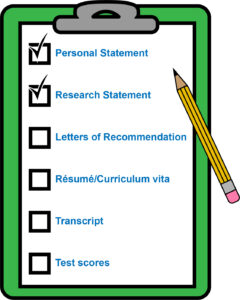Application Process
When Should You Apply?
Apply in the fall prior to the year you’d like to start graduate school. Application deadlines typically fall between October and February. Some schools have specific deadlines prior to application review, whereas others are rolling. Rolling deadlines begin application review as applications are submitted. Make sure to schedule any official testing several weeks or months in advance of these deadlines. Acceptances will begin in December and end in mid-April, so be patient!

Application Components:
- Personal statement. Your personal statement should be exactly that: personal. Communicate how your life experiences have influenced your decision to pursue a graduate degree in chemistry, how they have shaped you into the person you are, and how they have contributed to your unique perspective.
What are typical components of a personal statement?- General field of chemistry you are interested in and why
- Motivation for pursuing chemistry as a career. See section About Graduate School.
- Broader experiences that show how you positively impacted the scientific and/or general community (outreach, teaching, etc.). If a separate research experience statement is not included in an application, also include research interests/background here. See section Research Experience Statement below.
- Names of professors you would like to work with
- Visit each professor’s website for a flavor of their science and who makes up their group

- Visit each professor’s website for a flavor of their science and who makes up their group
- Research experience statement. The purpose of this statement is to demonstrate that you will be capable of carrying out research as a graduate student (i.e. independently). Focus on the contributions you made to the projects you worked on, discuss any relevant skills you acquired, and make sure to tie your experiences back to why you want to continue research in graduate school.
- Letters of recommendation. Typically, institutions require about three letters of recommendation. If you have started undergraduate research, request a letter of recommendation from your research advisor, as they can attest to your creativity, chemistry knowledge, and skillset. Other great options to request letters of recommendation from are professors that can comment on your strong academic performance; however, improvement and adaptability can demonstrate your potential as a graduate student and professors who know you well can speak to these qualities as well, even if you didn’t score an A in their class. Academic advisors can also comment on your trajectory over the years.
- Curriculum vita/résumé. Reiterate your lab/work experience, as well as tutoring, teaching, outreach, leadership, and science-related extracurricular activities. Make sure to list any publications (note progress on any manuscripts if not yet accepted to a journal), awards, and/or scholarships you received during your undergraduate degree. It is not recommended to include jobs or awards from high school unless they are particularly relevant (like research experience).
- Official transcripts. Request these directly from your university (or multiple universities if your degree wasn’t completed at a single institution). Be mindful of approaching deadlines! Some schools may take a week or two to process your request.
- Test scores (GRE and subject tests, if applicable). Check each university’s requirements and schedule any exams well in advance of application submission deadlines. Many schools will explicitly state whether these exams are optional. The Chemistry GRE subject test is offered much less frequently (i.e. ~3 times per year in limited locations), so plan ahead!
Note: Some testing has been waived since the beginning of COVID-19. So again, check with your target institution and plan well in advance!
Who to Talk to for Further Advice/Application Review
- Letter of recommendation writers. These should be people who know you well and can speak to your research experience, skillsets, positive attributes (determination, motivation, etc.), and contributions to society. If you would like someone to highlight specific experiences, challenges, etc., it is okay to ask them to do so here.
- A mentor in your undergraduate department, whether as a general advisor or as a research advisor, can provide you with specific details about applying to graduate school. They may also help you narrow down your list of target universities.
- Graduate students in research labs. Graduate students at your undergraduate institution can be a great resource for reviewing your application materials. Reaching out to graduate students in at your target institution can also be helpful to gauge research satisfaction, day-to-day lab experiences, and first-hand accounts of what it would be like to work with the professors you are interested in also working for.
- Friends and/or family. If you have friends or family that have recently applied to graduate school, their advice could be useful! Beware that Ph.D. programs differ by field of study and by institution, among other variables, so advice from people with a Ph.D. in the humanities may not translate well to STEM or chemistry Ph.D. programs.
